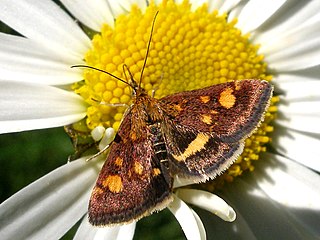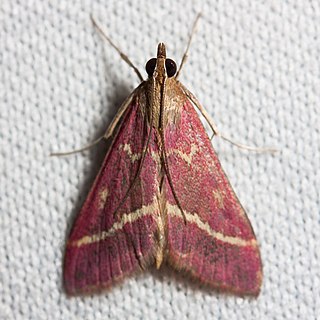Related Research Articles

The Crambidae are the grass moth family of lepidopterans. They are variable in appearance, the nominal subfamily Crambinae taking up closely folded postures on grass stems where they are inconspicuous, while other subfamilies include brightly coloured and patterned insects which rest in wing-spread attitudes.

Pyrausta is a speciose genus of moths of the family Crambidae. The genus was erected by Franz von Paula Schrank in 1802.

Pyrausta acrionalis, the mint-loving pyrausta moth, is a moth of the family Crambidae. It is found in eastern North America, including Alabama, Georgia, Massachusetts, Mississippi, New Hampshire, New York, Ontario, Tennessee, West Virginia and Wisconsin.

Pyrausta aerealis is a species of moth in the family Crambidae described by Jacob Hübner in 1793. It is found in most of Europe. It has also been recorded from Kyrgyzstan, Kazakhstan, Afghanistan, China and Algeria.

Pyrausta falcatalis is a species of moth in the family Crambidae. It is found in France, Germany, Austria, Switzerland, Italy, the Czech Republic, Poland, Slovenia, Hungary, Bosnia and Herzegovina, the Republic of Macedonia, Romania, Bulgaria, Moldova, Ukraine, Russia and Turkey. It has also been recorded from China.
Pyrausta limbopunctalis is a species of moth in the family Crambidae. It is found in Portugal, Spain, on Sardinia and in Russia, Turkey and North Africa, including Morocco.
Pyrausta obfuscata is a species of moth in the family Crambidae. It is found from Spain to Belgium and from France to the Balkan Peninsula, Ukraine and Russia.
Pyrausta porphyralis is a species of moth in the family Crambidae described by Michael Denis and Ignaz Schiffermüller in 1775. It is found in most of Europe.

Pyrausta phoenicealis, the perilla leaf moth, is a moth of the family Crambidae described by Jacob Hübner in 1818. It is found worldwide, including the Americas, Africa, Australia and Asia.
Pyrausta bicoloralis, the bicolored pyrausta moth, is a moth in the family Crambidae. It was described by Achille Guenée in 1854. It is found in North America, where it has been recorded from Nova Scotia south to Florida, west to Michigan and Texas. In the south, the range extends to South America.
Pyrausta genialis is a moth in the family Crambidae. It was described by South in 1901. It is found in China.

Pyrausta insignitalis, the dark-banded pyrausta moth, is a moth in the family Crambidae. It was described by Achille Guenée in 1854. It is found in the United States, where it has been recorded from Florida and South Carolina. It is also found on the West Indies, as well as in Central and South America.

Pyrausta perrubralis is a moth in the family Crambidae. It was described by Packard in 1873. It is found in North America, where it has been recorded from British Columbia, California, New Mexico, Oregon and Washington.

Pyrausta rubricalis, the variable reddish pyrausta moth, is a moth in the family Crambidae. It was described by Jacob Hübner in 1796. It is found in North America, where it has been recorded from Illinois to New York, south to Florida and Louisiana. It is also reported from the west coast, from southern California to Washington. The wingspan is about 15 mm and adults have been recorded on wing from March to October.
Pyrausta subsequalis is a moth in the family Crambidae. It was described by Achille Guenée in 1854. It is found in North America, where it has been recorded from southern Alberta and southern British Columbia south to Arizona and New Mexico. The habitat consists of dry prairie areas.

Pyrausta tithonialis is a moth in the family Crambidae. It was described by Zeller in 1872. It is found in Russia, China, Korea and Japan.

Pyrausta tyralis, the coffee-loving pyrausta moth, is a moth in the family Crambidae. It was described by Achille Guenée in 1854. It is found in the United States, where it has been recorded from New York to Illinois and from Florida to Arizona. It is also found from Mexico to Venezuela, as well as on the West Indies.

Pyrausta unifascialis, the one-banded pyrausta, is a moth in the family Crambidae. It was described by Alpheus Spring Packard in 1873. It is found in North America, where it has been recorded from Quebec west to British Columbia, south to Arizona and California. The habitat consists of forest openings, clearings and fields.

Pyrausta volupialis, the volupial pyrausta moth, is a moth in the family Crambidae. It was described by Augustus Radcliffe Grote in 1877. It is found in North America, where it has been recorded from Oklahoma, Utah, Texas, Colorado, New Mexico, Arizona and California to Chiapas, Mexico.
Pyrausta borealis, the northern pyrausta moth, is a moth in the family Crambidae. It was described by Alpheus Spring Packard in 1867. It is found in North America, where it has been recorded from Newfoundland and Labrador west to British Columbia, north to Alaska and the Yukon. The habitat consists of boreal forests.
References
- ↑ "global Pyraloidea database". Globiz.pyraloidea.org. Retrieved 2014-07-15.